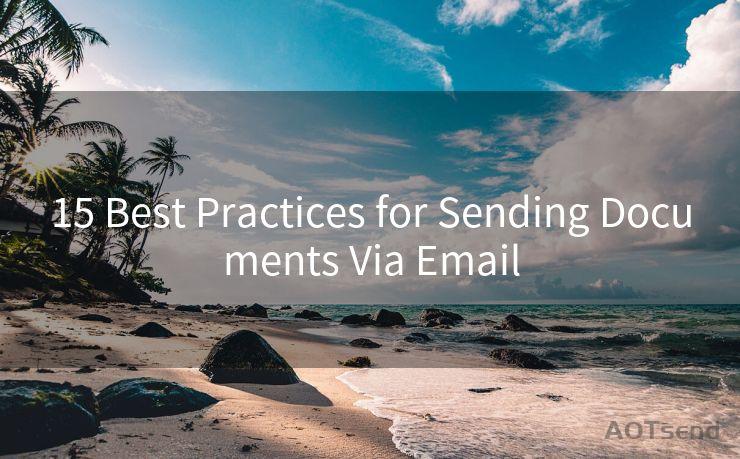15 Best Practices for Sending Documents Via Email




Email has become an essential tool for communication and sharing documents in today's digital age. However, sending documents via email can be tricky if not done correctly. To ensure smooth and secure document sharing, here are 15 best practices you should follow:
1. Use a Secure Connection
Always use a secure email service that offers encryption. This ensures that your emails and attachments are protected from unauthorized access during transmission. Look for services that support SSL/TLS encryption for added security.
2. Keep the File Size Small
Large file sizes can cause emails to bounce or be rejected by the recipient's server. Compress large documents or split them into smaller parts if necessary. Consider using cloud storage services to share large files and simply send a link via email.
3. Use Clear and Concise Subject Lines
The subject line should clearly indicate the content and purpose of the email. This helps recipients quickly understand the email's context and prioritize their responses.
4. Attach the Correct File
Double-check that you have attached the correct document before sending. Sending the wrong file can cause confusion and delay.
5. Virus Check Attachments
Always scan attachments for viruses before sending. This protects the recipient from potential malware and maintains your credibility as a sender.
6. Consider Privacy and Confidentiality
If the document contains sensitive information, use appropriate privacy settings or encryption tools to protect the data. Avoid sending confidential information via unsecured channels.
7. Use Professional Formatting
Ensure that the attached document is professionally formatted and easy to read. This enhances the recipient's experience and improves the chances of a timely and effective response.
8. Include a Clear Message
In the email body, briefly explain the purpose of the attached document and what action you expect from the recipient.
9. Use a Reliable Email Provider
Choose an email service provider with a good reputation for reliability and security. This reduces the chances of email delivery issues.
10. Test Compatibility
Before sending, check that the attached document is compatible with the recipient's software. Convert files to universally accessible formats if necessary.
11. Avoid Spam Filters
Be mindful of words and phrases that might trigger spam filters. Avoid using overly promotional language or excessive capitalization.
12. Request a Read Receipt
If confirmation of receipt is important, request a read receipt or delivery notification.
13. Follow Up
If you haven't received a response within a reasonable timeframe, follow up with a polite reminder.

14. Archive Important Emails
For legal or business purposes, archive emails with important attachments. This ensures you have a record for future reference.
15. Be Mindful of File Types
Certain file types, like executables (.exe) or scripts (.bat, .vbs), might be blocked by email providers or antivirus software. Stick to common and safe file formats like .pdf, .docx, or .xlsx.
🔔🔔🔔
【AOTsend Email API】:AOTsend is a Managed Email Service for sending transactional emails. Support Email Types: reminders, authentication, confirmations, notifications, verification codes, invoices, password resets, account activations, billing statements, two-factor authentication (2FA), and one-time passwords (OTP) emails, etc. $0.28 per 1000 Emails. 99% Delivery, 98% Inbox Rate.
You might be interested in:
Why did we start the AOTsend project, Brand Story?
What is a Managed Email API, How it Works?
Best 25+ Email Marketing Platforms (Authority,Keywords&Traffic Comparison)
Best 24+ Email Marketing Service (Price, Pros&Cons Comparison)
Email APIs vs SMTP: How they Works, Any Difference?
By following these 15 best practices for sending documents via email, you can ensure efficient, secure, and professional communication in today's digital world. Remember, email is still a primary means of communication, and mastering these practices will serve you well in both personal and professional correspondences.




Scan the QR code to access on your mobile device.
Copyright notice: This article is published by AotSend. Reproduction requires attribution.
Article Link:https://www.mailwot.com/p1267.html



